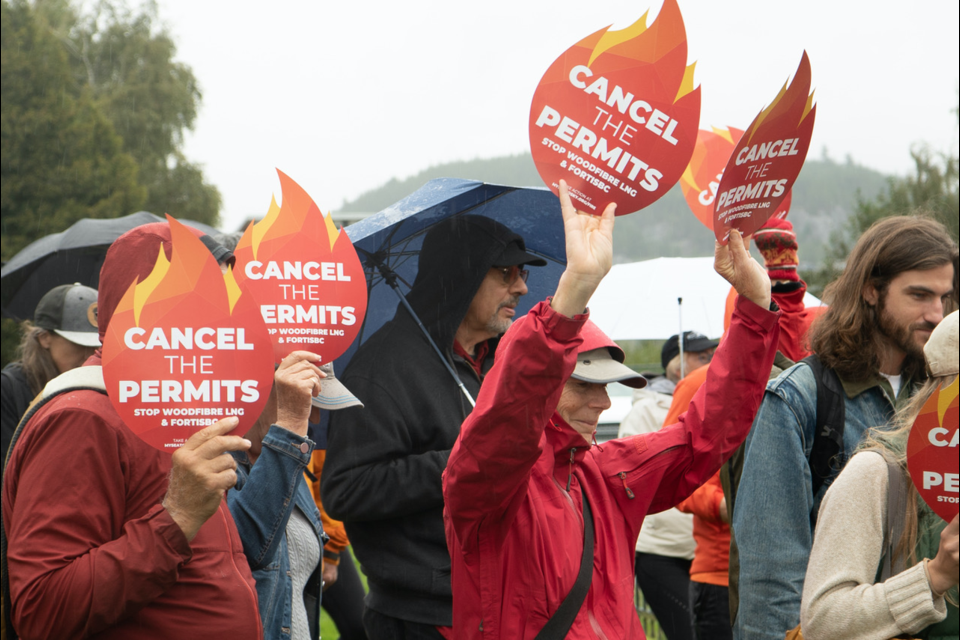On Saturday, several leaders of Indigenous nations and their allies gathered in Squamish to protest the expansion of liquefied natural gas (LNG) projects on unceded Indigenous territories in B.C.
The demonstration opposed the Woodfibre LNG project, which will have the capacity to export 2.1 million tonnes of LNG per year, and the associated FortisBC’s Eagle Mountain–Woodfibre Gas Pipeline, a 47-kilometer pipeline expansion to connect Port Coquitlam to the Woodfibre site in Squamish.
The Woodfibre LNG project and the FortisBC pipeline were subject to the Sḵwx̱wú7mesh Úxwumixw (Squamish Nation) environmental assessment (EA) process, which was the first legally-binding Indigenous-led environmental assessment of a project in Canada. The Nation’s approval of Environmental Certificates for the Woodfibre LNG and FortisBC projects triggered the creation of an Environmental Working Group for each project, which monitors the work.
Pre-construction preparations for the Woodfibre LNG project and FortisBC pipeline have begun.
The Saturday rally, which organizers say saw 160 to 200 people attend, began with an Indigenous-led witness ceremony at Junction Park and continued with a one kilometre march through downtown Squamish.
Protesters carried signs reading “Stop LNG” and “Protect Our Land,” calling for the provincial government to cancel LNG permits. The demonstration ended with speeches from Indigenous leaders, climate activists, and a health professional.
Speakers included Tioutenaat (Jackie Williams), a Nation Elder; Chief Na’Moks (John Ridsdale), Wet’suwet’en Nation Hereditary Chief of the Tsayu (Beaver Clan); Gwii Lok’im Gibuu (Jesse Stoeppler), a member of the Wet’suwet’en and Gitksan Nations and co-executive director at Skeena Watershed Conservation Coalition; Will George, a Tsleil-Waututh Nation member; Janelle Lapointe, an Afro-Indigenous climate justice organizer from Stellat’en First Nation and senior advisor at the David Suzuki Foundation; Squamish’s Tracey Saxby, executive director of My Sea to Sky; and Dr. Larry Barzelai, a Vancouver family physician and chair of the B.C. Branch of the Canadian Association of Physicians for the Environment (CAPE).
Ridsdale highlighted the significance of the gathering for him: “It means that people who are like-minded and like-hearted work together to get full information, instead of having to receive the greenwashing, which they've received for a number of years, not only by corporations and industry, but the government itself.”
Concerns over the cultural, environmental, and economic impacts of LNG projects on Indigenous communities were also raised. “In Squamish, it's at so many levels," Ridsdale said.
"I don't think they'll realize how absolutely terrible this will be until those heavy equipment are digging up their yards … to bring it through communities. It's quite amazing that they actually got permission to do that, and then where the facility is, like on the end of the inlet, if you stand at the end of it, that wind blows straight from there into the community.”
Potential health impacts were also at the forefront of the protest.
“I was very pleased that CAPE, which is the Canadian Association of Physicians for the Environment, spoke up and talked about the health issues that are common, and these are proven health issues," Ridsdale said.
“They are physicians, so they've done the studies. They're not like industry or government, who can greenwash,” he said.
CAPE raised concerns in a press release on Aug. 13 about the link between LNG projects and respiratory problems, as well as birth defects, highlighting that long-term exposure to emissions from LNG facilities can have serious health consequences.
Solidarity between Indigenous and non-Indigenous communities was a key theme of the protest. “Working together is how humans are supposed to be. It doesn’t matter if you’re Indigenous or non-Indigenous. The fact that they’re harming not only communities, but the planet, means humans need to stand together,” Ridsdale said.
He called for the B.C. government to cancel LNG permits. “First and foremost, that their voices matter. They can make a difference.”
This demonstration is part of a larger movement across British Columbia calling for a halt to the expansion of fossil fuel infrastructure, with opposition from both environmental and Indigenous groups.
Bhagyashree Chatterjee is The Squamish Chief’s Indigenous affairs reporter. This reporting beat is made possible by the Local Journalism Initiative.
Please note that we updated this story after it was first posted to say that 160 to 200 people attended; the story originally said 100.




